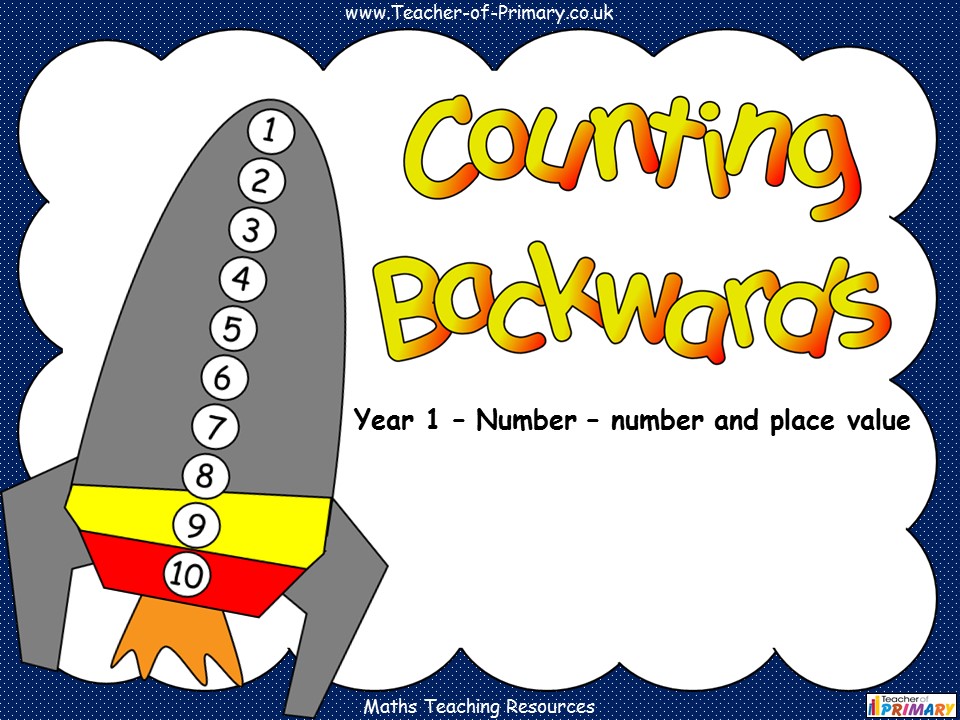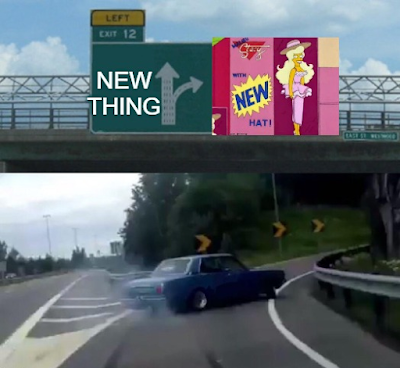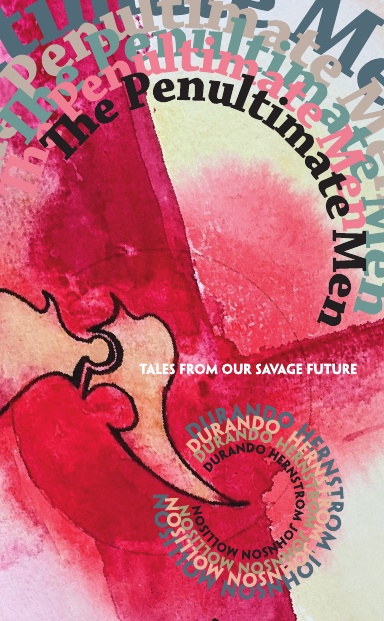A long time ago, hobbies were hobbies and people treated them as such. Today, they are entire "lifestyle brands" and "communities" where people go to get their entire personalities from. What that sort of view has led to is tribalism and lunch table theatrics on par with the worst of secondary education. It hasn't led to better scenes, higher quality products or ideas, or more scrupulous "fans" and customers. All that has happened is that is has given corporations more eager drones to hand them many for the brand title on their product--brand titles they swiped and subverted from the people who created them and are long gone.
We are living on the scraps of a long dead era while simultaneously spitting on those very people who created what we love so we can keep our scavenger culture alive. It's disgusting, but it does help us avoid actually moving towards a future worth living in. We instead get stuck in a cult of our own personality where everything we like reflects back on us like Narcissus finding that perfect pool for himself. At the end of the day, it always about us and what we can benefit from: not what we can learn from others or how we can grow from where we are. You can see this most clearly on social media, though I would thoroughly recommend staying well clear of that disaster if given the chance too. It really does show the worst of us.
But the issue is more than that. It is like we lost the page count on a book we're reading so we instead just randomly skip around and pretend we understand what's happening inside. No one is fooled except for ourselves, but still we do it.
One of the strangest aspects of living in Clown World is how backwards everything has gotten over the decades, to the point that many might not have even realized it. I'm certain you can find all sorts of examples just by paying attention to world events and how opinions flip and all converge in the same direction over night, but the most obvious place this exists in is in our every day lives. It's subtle, but obvious when you notice it.
Take the above image, taken from Twitter. It would have to be social media, of course. The image shows a library of books entirely assembled to teach you how to play a game. Included are no history books, no short story collections or anthologies, or anything that would have caused the game to exist in the first place, but only books centered on doing the heavy-lifting of your imagination for you so you can consume product easily and in peace.
Before I annoy a contingent of tabletop gamers over the above, I want to specify the point being made here. This isn't about buying modules or general handbooks to understand your game better. It is about what the game, and all games, have always been intended to be about from the very beginning. This also goes well with obsession of "story-based" gaming of the above users.
Games are created from distinct parts and histories that merge together to form a new set of rules for the gamers to conquer. A game is defined by its rules which the players work with in order to beat. In essence, you should only need one rulebook or instruction manual to understand how to play a game. Why would you ever need more than one unless the game is either broken, or the people who made it want to syphon more money off of you?
This dove-tails into a point I made a while back on the bird site myself:
We are reading games and playing books and no one has realized it has turned around backwards from where it started.
Without fail almost all the replies and quote-tweets of the above image were all about this being the Ideal Library and the way it should be, but few seemed to really point out how upside down a goal having such a thing should be. Libraries are for knowledge, not learning to play games. In fact, libraries as they are classically defined as such, should already be helping you learn to play these games better. Libraries are basically where games came from, after all.
What makes it bizarre is how much tabletop gaming is formed from wargaming and games like Dungeons & Dragons were explicitly made to imitate the sword and sorcery short stories back in the day. You need a library of old books to even understand the context of these games. Theoretically, all the modules and handbooks for D&D already exist: they are the very books that created said game to begin with. Everything you need came from them and it was up to you to utilize these works in your own game.
But one perusal of the above bookshelf gamers are raving over contains none of those books. It actually contains nothing in the way of anything aside from corporate product. The owner would rather read his games and keep his playstyle locked into the technical framework of whoever owns the brand now. The owner would prefer exercising the same nuts and bolts instead of exercising his imagination to learn new ways to approach the classic games he apparently loves so much and spends much of his life pouring money into.
This might not be such an issue if so many in that scene (I can't definitively say whether the OP is one of these people or not) were not so vitriolic to the idea of reading old books, including the ones their games came from. The books that inspired the very scene they model their lives around, written by old dead men, are very much worthless. Why read those when you have "experts" and "influencers" in corporate positions to sell prepackaged imagination and ideas to you instead? Why do the heavy lifting when you can pay people to do it for you?
Why would you want to read Lord Dunsany to see magical and unknown worlds full of danger and wonder when you can buy a corporate module that mechanically writes out specific scenarios out for you to follow?
Why would you want to read Harold Lamb, the man who inspired Robert E. Howard to write Sword & Sorcery to begin with, as he imaginatively describes the heroism of crusaders, Cossacks, and strangers in the desert? How about his history books? Why bother when history has nothing to do with why your game exists in the first place? Right?
Why would you want to read Andrew Lang's fairy books where the idea for such stories were inspired? Why bother when you can have people repackage and sell you warmed over ideas from the 1980s instead?
Isn't there more to life than that?
Why do you desire to read games instead of reading books? Why do you desire to play books instead of playing games? Why do we never question how tangled up this has become? These are questions that are never quite answered.
This isn't any different in other subcultures. There is no real reason to single out one them. This is pretty much status quo everywhere.
Comic books wish to be dragged out movie screenplays even as movie screenplays poorly imitate comic books. Meanwhile, the original audience for comics, kids, are completely ignored entirely for full grown adults still playing dolls with their youth. Who is Cyclops going to date this week?! Who cares.
Video games insult themselves as being too "video-gamey" for having elements (like HUDs, life bars, stage-based progression, lives, or even scores) because gamers think it "takes them out of it" for whatever reason. They applaud the removal of video game music for bad, indistinctive wannabe Hollywood "scores" that even Hollywood didn't use at their best. Video games should be rolling in pulp clichés--not trying to aim for their own "Citizen Kane" in a medium that doesn't support it. Their roots have been jettisoned.
At some point they all decided being destroyed and subverted was a Good Thing. Even as their industries die.
Meanwhile, everyone wants to be Hollywood, an industry that has been on a downhill slide since the 1990s, and makes less and less every year while the majority of people walk away searching for something better. For some reason we wish to imitate this dying industry anyway. Why are we trying to lead them back where they already fled from?
Aside from being backwards, putting on new hats is not creativity. It's just a gimmick. Worse--it's a gimmick that is a failure. And still we cling to it.
Is there not more to life than that? When did slavishly following along with the crowd like lemmings off a cliff be thought of as noble? Why is having a lack of imagination considered a badge of honor? How does this put you above the people who came before you?
The weird arrogance that comes in defense of the above subversion of healthy traditions to objective degradations never ceases to amaze. Why brag about how much less you have than those who came before? How does this improve your station or scene in any positive way? How long are we going to keep this up for as everything implodes?
We form "communities" around these things, then, not preserve what we love, but to brag about warping it from its original intent to attract onlookers who don't care about said source to begin with. And then we wonder why nothing improves.
Perhaps it can be accepted now? This doesn't work.
We've gotten ourselves all mixed up and caught in our own spiderwebs, unsure of how we got there but adamants that being stuck and unable to move is the Way It Should Be. Perhaps complacency and comfort from better times allowed this to be, but that doesn't mean it should stay that way forever. Especially when those days are long gone.
I've been floating around in independent spaces for a while now and can definitely see a strong contingent of those righting the ship that was long ago steered into icebergs. They are counting backwards to the past to find their inspiration to start with in order to move forward. They then count forwards towards a better future.
As an example, you can check out the crowdfund for author Schuyler Hernstrom's Thune's Vision, organized by Pilum Press. This is a talented author, aided by a like-minded small pub, to revisit the roots that had been abandoned for so long and create something new from it.
Mr. Hermstrom writes adventure and weird of the old kind, the sort that would have run in Weird Tales were it still around: sword and sorcery as well as horror with a fairy tale edge. These are the sort of stories OldPub and the dying industry rejected long ago. You would do well backing the project if you have not yet. Mr. Hernstrom's material is worth it!
Thune's Vision already has over 100 backers and has blown past its initial goal for funding, proving there is a burgeoning audience for these sorts of stories. Check the campaign yourself and be amazed at the progress it has already made!
Why buy yet another module to file on your shelf when you could instead exercise your imagination by reading the sort of stories that helped invent your hobby to begin with? Inspire your games with actual stories.
Pilum Press has also started another campaign for a different writer by JB Jackson entitled Shagduk, which is the first book in a new series called De re dordica.
The description is as follows:
"The year is 1977. Professor Sherwood has gone missing. Between working at the library and playing gigs in Fort Worth holes in the wall after hours, Steven and his pal Randy set out to discover why, unwittingly summoning a demon and setting into motion a chain of astonishing events that could put the entire world at risk of total destruction."
You can find the campaign for Shagduk here.
For more on Pilum Press, including their unique anthologies, you can find their site here. They are doing some good work!
There is plenty out there aiming to give you what has been missing for some time now. Counting backwards works out more often than not, especially in an age that has long forgotten what mathematics even is.
Then again, 2022 is just getting going. Who knows what else is coming down the pike? I can assure you, however, that the best stuff will be like this: from those going back to the past to bring us towards a better future. Counting backwards is the exact approach we need to be able to learn how to count forward again. Keep an eye out! Good times are on the way.
Just remember to keep counting.



























